7 min to read
The Anatomy of a High-Performance B2B Agency in DemandGen Strategy
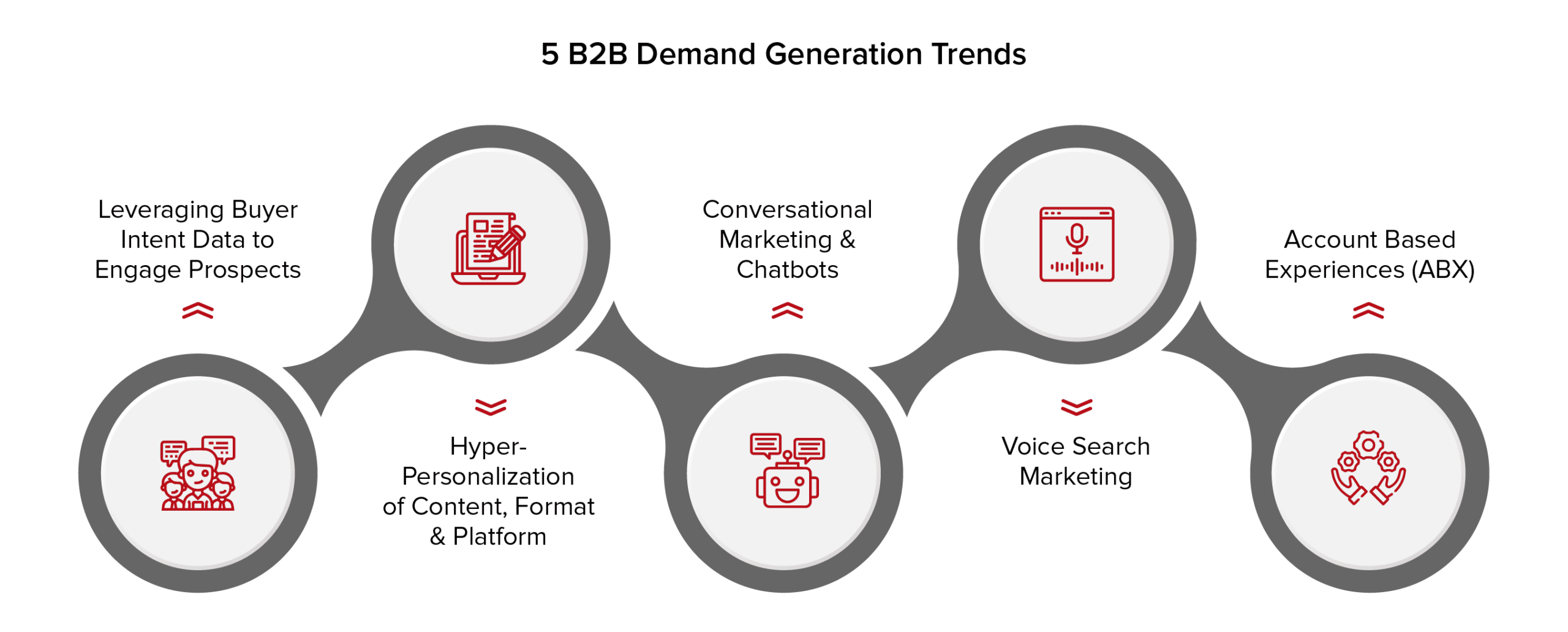
Demand Generation (DemandGen) is a critical component in achieving sustainable growth and competitive advantage, especially in the B2B sector. At CodeDesign, we've seen firsthand how effective DemandGen strategies can significantly impact a company's market presence and growth trajectory. DemandGen involves strategic processes that cultivate interest and awareness in a company's products or services with the goal of developing a pipeline of qualified leads that can convert into sales.
In the B2B sector, where sales cycles are typically longer and the buying process involves multiple stakeholders, the role of DemandGen becomes even more pivotal. It's not just about generating leads; it's about generating the right leads that are well-informed and have a high potential to convert into loyal customers.
You could work with us, the leading digital marketing agency in Lisbon, Portugal.
Understanding target demographics and decision makers
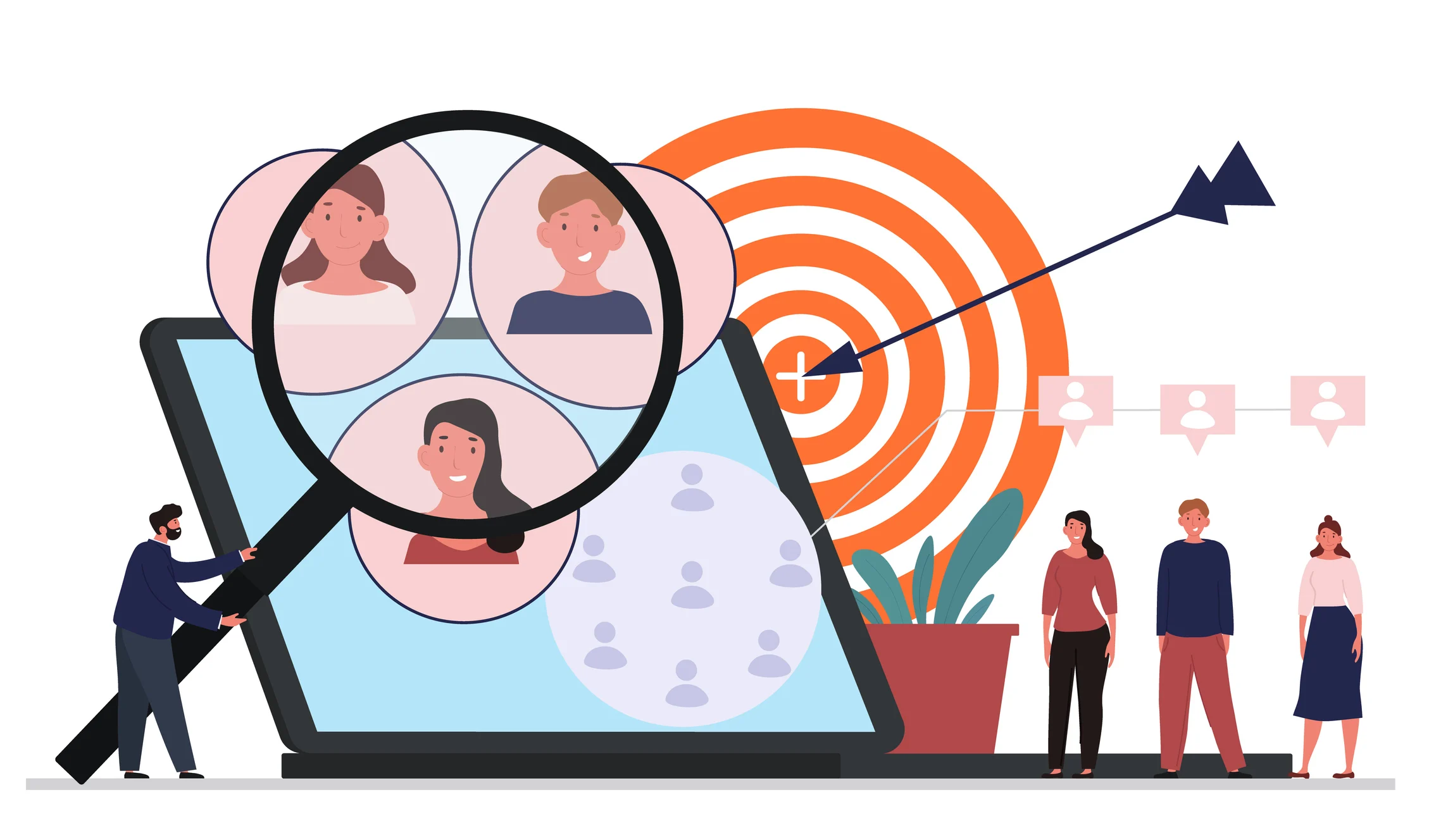
Identifying and understanding target demographics, including buyer personas and decision-makers, is a fundamental aspect of our marketing strategy at CodeDesign. This process enables us to tailor our marketing efforts to meet the specific needs and preferences of our audience, thereby increasing the effectiveness of our campaigns and improving conversion rates.
Our first step is to gather as much data as possible about potential and current customers. This involves collecting demographic information, such as age, gender, location, and profession, as well as psychographic data, like interests, behaviours, and values. We utilise various sources for this data, including web analytics, social media insights, customer surveys, and purchase histories.
Creating Buyer Personas
Using the data collected, we create detailed buyer personas that represent our ideal customers. These personas are fictional but are based on real data about our customer base. They help us understand who our customers are, what challenges they face, and what they value in a product or service. For instance, a typical persona might be a mid-level marketing manager in a tech company who is looking to streamline her digital marketing efforts with efficient tools and reliable analytics.
Identifying Decision-Makers
In the B2B context, the decision-making process often involves multiple stakeholders. Thus, understanding who these decision-makers are, and what their specific needs and pain points might be, is crucial. We map out the decision-making hierarchy within typical client organisations to identify these key individuals and tailor our messaging to address their unique concerns and objectives.
Segmentation and Targeting
Armed with detailed personas and a clear understanding of decision-makers, we segment our audience based on similarities in needs, behaviours, and decision-making power. This allows us to tailor our marketing strategies and content more effectively, ensuring that each segment receives messages that resonate deeply with their specific characteristics and needs.
Understanding the B2B buyer journey
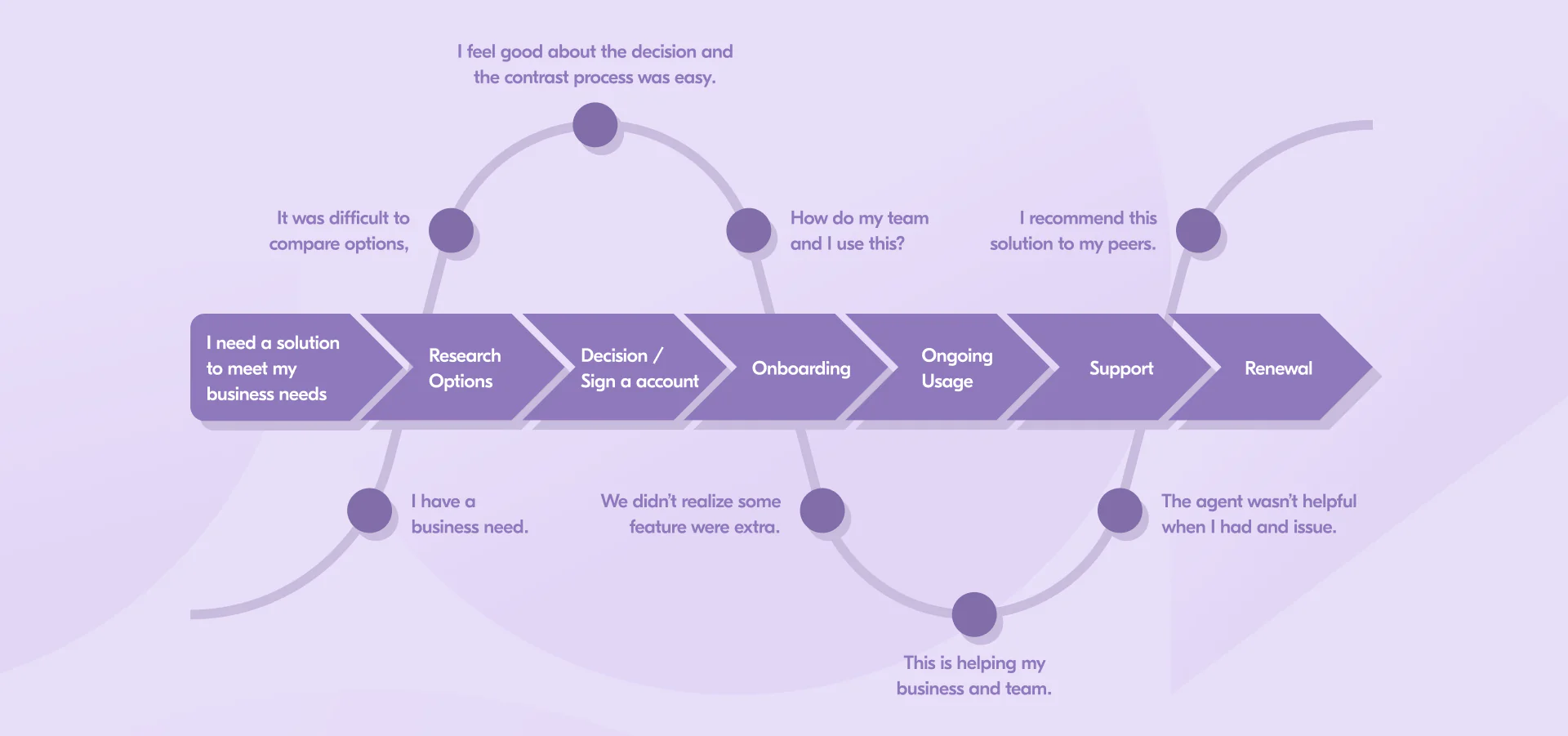
B2B buyer journey
Understanding the B2B buyer journey is critical to developing an effective Demand Generation (DemandGen) strategy, particularly in the complex landscape of B2B sales where decisions are highly calculated and involve multiple stakeholders.
First and foremost, a digital marketing funnel is created when you map out the different stages a customer goes through from the time they first hear about your product or service to the point where they either buy or abandon it. At each stage of the funnel, you'll want to put different strategies and techniques in place to encourage customers to move further down the funnel and closer to making a purchase.
Phases of the B2B Buyer Journey
Awareness Stage: Here, potential clients are just beginning to recognize they have a problem or a need. Our strategy at this stage involves content marketing that aims to educate the audience about these challenges and introduces them to potential solutions. This is done through informative blog posts, whitepapers, industry reports, and educational webinars.
Consideration Stage: At this point, buyers understand their problem and are actively looking for solutions. They are comparing different products, vendors, or services. Our approach involves targeted content that positions our services as the optimal solution. We utilise case studies, product comparison guides, and detailed service descriptions to help potential clients see the value and differentiation of our offerings.
Decision Stage: This is when the buyer is close to making a purchase decision. Our tactics here include more direct and persuasive content like testimonials, reviews, and strong call-to-actions (CTAs). We also engage in more personalised communication such as targeted email campaigns, personalised demos, or consultation calls to address any specific concerns or questions.
Content Strategy and SEO go hand in hand
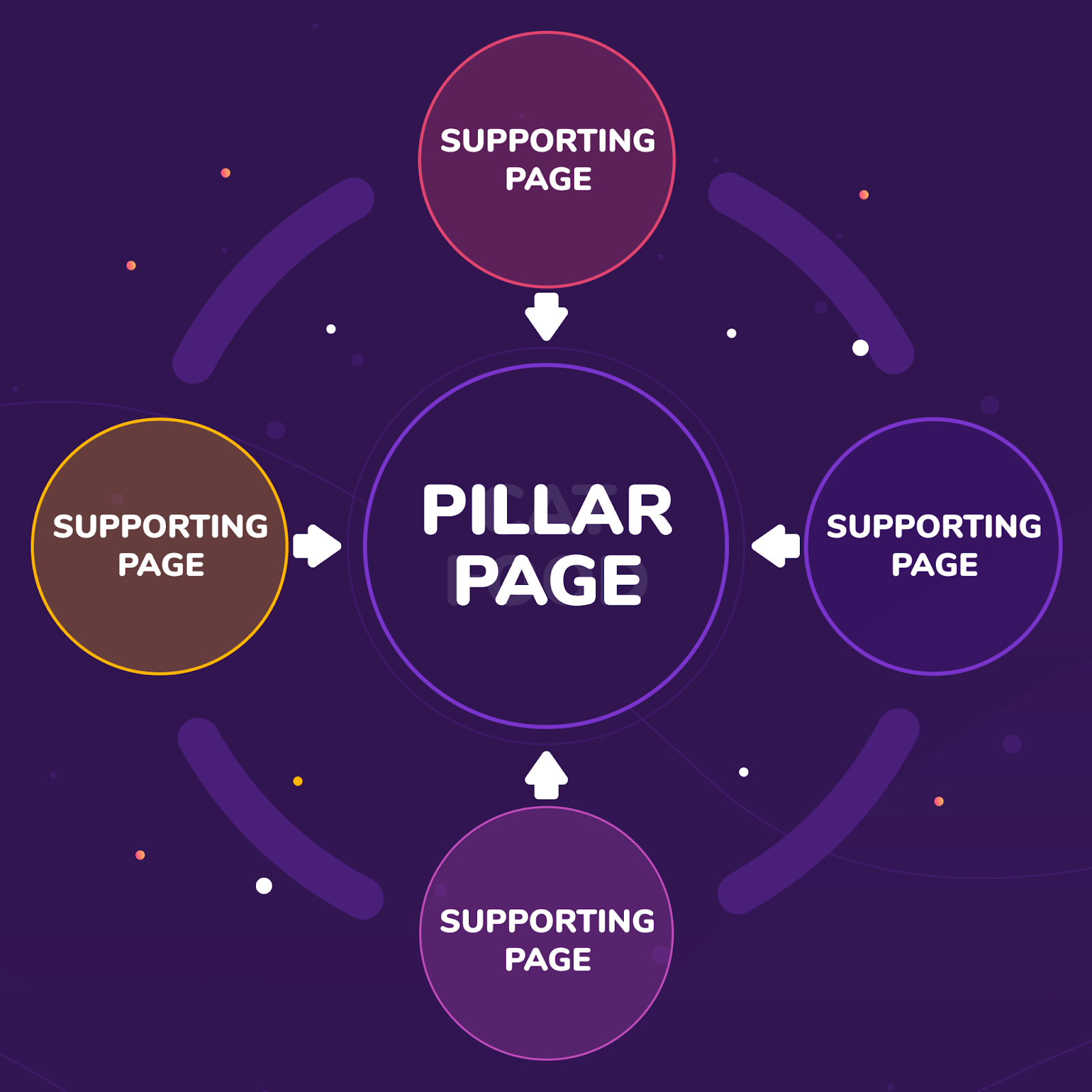
At CodeDesign, we approach content creation with a keen focus on advanced strategies like topic clusters, intent-based content creation, and semantic search optimization. These methodologies are pivotal in enhancing search engine visibility and improving user engagement, which are essential for our clients' digital success.
Topic Clusters: We implement topic clusters by organising related content around a central theme or pillar content, which is a comprehensive guide on a specific topic. This main piece is linked to various subtopics, known as cluster content. This strategy not only helps in establishing authority on a subject but also improves website architecture by enhancing the interlinking of pages.
This interconnected content strategy boosts SEO as it signals to search engines that the website is a reliable source of information on particular topics. For example, for a tech client in the healthcare sector, we might create a pillar page about "Patient Management Software," with cluster content covering subtopics like "Data Security in Patient Software," "Integrating AI in Patient Management," and "Best Practices for Software Training."
Intent-Based Content Creation: Understanding the user's intent behind search queries is critical for creating effective content. We categorise intent into informational, navigational, transactional, or commercial investigation. This approach allows us to tailor content that not only answers users' questions but also guides them through the sales funnel. For instance, if a user is looking for "how to improve online sales," the intent is informational, and we would provide a detailed blog post or guide. If the intent were transactional, like "best tools for increasing online sales," we might highlight specific products or services our client offers.
Semantic Search Optimization: We optimise content for semantic search by focusing on context rather than just keywords. This involves using related terms, synonyms, and themed vocabulary that help search engines understand the topic deeply and serve it to the right users.
By structuring content that answers broader questions and covers related subtopics, we enhance our clients' chances of appearing in voice searches and Google's rich answers. For example, rather than stuffing keywords, we might develop a comprehensive FAQ section that naturally incorporates a variety of related terms and questions.
Programmatic Advertising
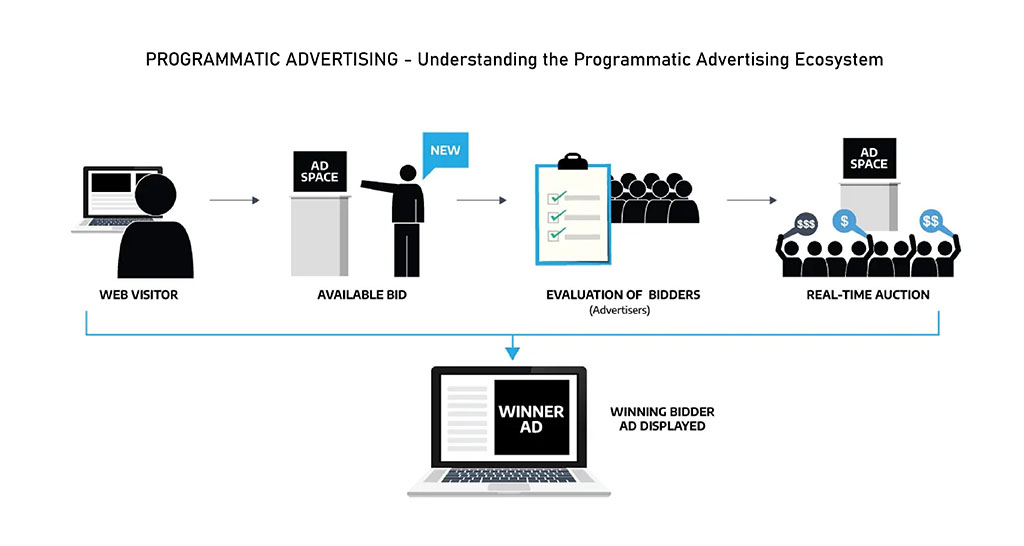
Programmatic advertising is a digital advertising method that automates the decision-making process of where ads are placed, using artificial intelligence and real-time bidding for inventory across mobile, display, video, and social channels. It allows for highly efficient and precise ad placements, targeting specific audiences based on data such as demographics, behaviour, and browsing habits.
Utilise Data Analytics for Programmatic Ads
We use data analytics extensively to refine and enhance audience targeting in programmatic advertising for our clients. Programmatic ads allow for highly targeted and automated ad placements based on sophisticated algorithms and real-time data. Here’s how we approach precise audience targeting:
Data Collection and Integration: The first step in our process involves collecting a wide range of data. This includes demographic information, online behaviours, browsing histories, and engagement across various digital platforms. We integrate data from multiple sources, such as CRM systems, website analytics, and third-party data providers, to create a comprehensive picture of potential customers.
Audience Segmentation: Using the collected data, we segment the audience into distinct groups based on shared characteristics such as age, location, interests, and past purchasing behaviour. This segmentation allows us to tailor messages that resonate with specific audience segments. For example, if data shows that a segment of users interested in high-tech gadgets frequently visits certain technology news websites, we can specifically target these users with ads for electronics during their visits to those sites.
Predictive Analytics: We employ predictive analytics to anticipate future behaviours of our audience segments. By analysing historical data and identifying patterns, we can predict which products or messages certain segments are more likely to respond to. This predictive capability allows us to proactively adjust our targeting strategies, improving the relevance and effectiveness of our ads.
Real-Time Bidding (RTB) and Optimization: In the programmatic ad space, real-time bidding enables us to purchase ad space automatically, targeting the right audience at the optimal moment. Our data analytics tools assess the performance of ads in real-time, allowing us to make immediate adjustments. This might involve shifting budgets to more successful campaigns or tweaking ad creatives to better appeal to target demographics.
CodeDesign has a track record with B2B DemandGen
CodeDesign has a robust track record in enhancing Demand Generation (DemandGen) for B2B clients, harnessing a blend of innovative digital strategies and data-driven insights to drive business growth and increase market penetration.
Our approach focuses on understanding the unique challenges and objectives of each B2B client. We begin by conducting thorough market research to identify key buyer personas and understand the specific needs and pain points of their target audience. This foundational knowledge allows us to tailor our marketing efforts to resonate deeply with potential customers.
We utilise a mix of SEO, content marketing, email marketing, social media, and programmatic advertising to create a cohesive and comprehensive DemandGen strategy. Each element is carefully chosen and designed to work synergistically, ensuring that every touchpoint along the customer journey is optimised for engagement and conversion. We employ advanced analytics and marketing automation tools to segment audiences, personalise messaging, and manage leads more efficiently. This technology enables us to deliver the right message to the right person at the right time, significantly enhancing the effectiveness of our campaigns.

About Bruno GavinoBruno Gavino is the CEO and partner of Codedesign, a digital marketing agency with a strong international presence. Based in Lisbon, Portugal, with offices in Boston, Singapore, and Manchester (UK) Codedesign has been recognized as one of the top interactive agencies and eCommerce agencies. Awarded Top B2B Company in Europe and Top B2C company in retail, Codedesign aims to foster personal relationships with clients and create a positive work environment for its team. He emphasizes the need for digital agencies to focus on data optimization and performance to meet the increasingly results-driven demands of clients. His experience in digital marketing, combined with a unique background that includes engineering and data, contributes to his effective and multifaceted leadership style. |

About CodedesignCodedesign is a digital marketing agency with a strong multicultural and international presence, offering expert services in digital marketing. Our digital agency in Lisbon, Boston, and Manchester enables us to provide market-ready strategies that suit a wide range of clients across the globe (both B2B and B2C). We specialize in creating impactful online experiences, focusing on making your digital presence strong and efficient. Our approach is straightforward and effective, ensuring that every client receives a personalized service that truly meets their needs. Our digital agency is committed to using the latest data and technology to help your business stand out. Whether you're looking to increase your online visibility, connect better with your audience, get more leads, or grow your online sales. For more information, read our Digital Strategy Blog or to start your journey with us, please feel free to contact us. |
CodeDesign is leading:
- Digital Agency
- Digital Marketing Agency
- Digital Ecommerce Agency
- Amazon Marketing Agency

Add comment ×